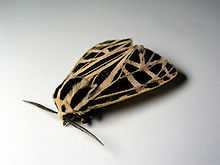Parthenice Tiger Moth
| Grammia parthenice | |
|---|---|
 | |
| Scientific classification | |
| Kingdom: | Animalia |
| Phylum: | Arthropoda |
| Class: | Insecta |
| Order: | Lepidoptera |
| Family: | Arctiidae |
| Genus: | Grammia |
| Species: | G. parthenice |
| Binomial name | |
| Grammia parthenice (Kirby, 1837)[1] | |
| Synonyms | |
| |
The Parthenice Tiger Moth (Grammia parthenice) is a moth of the Arctiidae family. It is found in Southeastern Canada, and the eastern United States. The moths are common in fields and woodland edges from June to late September. The moth is nocturnal and is attracted to light sources.[2]
The wingspan is about 7.5 cm (3 inches. The forewings and the thorax are black, with a complex network of bold white veining and white margins. The hind wings and abdomen are orange-pink with black patches. The brightly striped pattern of the wings has inspired the common name of Tiger Moth. Their bodies are stout and furry[3]
Caterpillars of the species are dark with contrasting bright markings and covered with stiff hairs. They are toxic like the adults. Many species of tiger moths contain toxic substances, and so the bight patterns of both adults and larvae serve as a warning to predators. Contact with the hairy bodies of these caterpillars can cause skin irritation. Tiger moths have a well-developed hearing organ, or tympanum, on each side of the thorax.The larvae feed on various low growing plants, including dandelion, Vernonia and thistles.
References
- ↑ http://bugguide.net/node/view/5907 Retrieved 2010-1-12
- ↑ http://entweb.clemson.edu/museum/moths/local/moth8.htm Retrieved 2010-1-8
- ↑ http://entweb.clemson.edu/museum/moths/local/moth8.htm Retrieved 2010-1-8